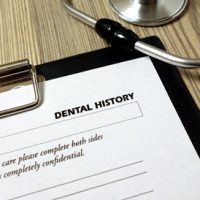Ethics In Dental Records

Just like when you visit a doctor, a dentist also keeps detailed records of your mouth and any work performed. Your dental record serves as both a medical and legal document. It provides continuity of care and is a critical document in the event that a malpractice claim is filed against the dentist.
The dental record should be clinical in nature and include the following information:
- Patient’s personal information such as name, birth date, address, contact information, and telephone numbers
- Medical and dental histories, along with any notes or updates
- Progress and treatment notes
- Conversations about proposed treatment, as well as potential benefits, risks, and alternatives
Many dentists and assistants have detailed notes. Typically, the more detail, the better. But what notes, if any, should be taken about the patient’s personality?
It’s important to stick to the facts. Any opinions or subjective comments should be left out of a patient’s record. You should not call a patient names or label them as adjectives such as a “smoker” or “gagger.” You can state facts, such as “the patient smokes” or the patient “has a sensitive gag reflex.”
Why is properly documenting a dental record so important? It’s all because of the Health Insurance Portability and Accountability Act of 1996 (HIPAA). This act gives patients the legal right to review their dental and medical records, including clinical note entries. The problem is that these entries may contain subjective comments or statements made about a patient by a dentist or anyone on their team. These dental records are often subpoenaed by lawyers for various reasons. They can also be requested by the dental board if a patient has filed a complaint. The patient can see these records, so be careful what you write. It can and will be used against you. Patients can request changes in their medical records if there are mistakes.
Because of this, dentists and their teams should aim for professionalism in their notes. They should be careful not to include comments that can be construed as judgmental. Medical records can be a doctor’s best defense or their worst enemy, especially when the patient’s record is used as a personal diary.
Experts caution against including the following information in the patient’s medical record:
- Financial or health insurance information
- Subjective opinions
- Speculations
- Blame of someone else
- Legal information
- Unprofessional or personal comments about the patient
- Derogatory comments about colleagues
Keep Your License With Help From a Tampa Dentistry License Lawyer
Dentistry records contain a lot of personal and confidential information. Dentists need to perform their work without judgment or else they could face ethical issues.
A Tampa dentistry license lawyer from The Law Offices of David P. Rankin, P.A. can help your office stay compliant and avoid any HIPAA issues or other problems that can cause you to lose your license. To schedule a consultation, call (813) 968-6633 or fill out the online form.
Source:
todaysrdh.com/what-should-and-what-should-not-be-written-in-a-patients-dental-record/

